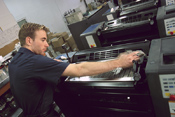
|
|
Rapid manufacturing
 Rapid manufacturing is a type of manufacturing that can help speed up the manufacturing process. Manufacturers who use rapid manufacturing can create custom products quickly. This can help the manufacturer keep up with its competitors. This article discusses more about rapid manufacturing.
Rapid manufacturing is a type of manufacturing that can help speed up the manufacturing process. Manufacturers who use rapid manufacturing can create custom products quickly. This can help the manufacturer keep up with its competitors. This article discusses more about rapid manufacturing.
|
|
What is rapid manufacturing?
There are several different things that make up rapid manufacturing-also known as RM. Within many regular manufacturing processes, prototyping and tooling are done. In rapid manufacturing, the prototyping and tooling are known as rapid prototyping and rapid tooling because they are accomplished much faster. Rapid manufacturing also uses a layering technology that can help the final product be created quickly.
What is rapid prototyping?
Generally in any type of manufacturing a prototype is made. With this prototype the manufacturer can demonstrate how the product will work, evaluate the product, and test it. Making a prototype of a product to use for testing and evaluation can save a manufacturer a lot of time and money instead of manufacturing hundreds of the product before finding out if it really works or not.
During rapid manufacturing, a prototype is also made, but it is made much faster. Usually the manufacturer that is using rapid manufacturing will create a rapid prototype using some kind of layer manufacturing technology that is available. With these layer technologies, a three-dimensional prototype can be made from a computer-based model.
There are several different types of layering technologies. Some of the different technologies used in rapid prototyping include: selective laser sintering or SLS, stereolithography or SL, fused deposition modeling or FDM, and laminated object manufacturing or LOM.
What is rapid tooling?
Rapid manufacturing also includes rapid tooling. Rapid tooling is the creation of the tools that are needed to mass produce the items that the manufacturing is going to produce. Tools that can be rapidly manufactured can include dies or molds.
Other uses for rapid manufacturing
Rapid manufacturing does not just have to be used in rapid prototyping; it can also be used to help create the final products that the manufacturer is producing. Rapid manufacturing can help decrease the amount of time that it takes to make the final product. Sometimes it can even decrease from several months to a few days.
Advantages to using rapid manufacturing
Even though rapid manufacturing may not be as fast as the regular mass production of products it can end up producing products that are custom. This can be a great way for the manufacturer to meet the needs of their customers better than if they were to make a lot of the exact same products.
Rapid manufacturing also eliminates some of the extra things that are included in the regular mass production of goods. For example, rapid manufacturing can eliminate the assembly process, the setup, and the tooling.
Using rapid manufacturing can help a manufacturer product a higher quality of product than mass production as well. And the great thing about using rapid manufacturing is that it creates a higher quality product quickly.
Who can use rapid manufacturing?
Many different manufacturers can use rapid manufacturing. Rapid manufacturing can be used to make castings and casting dies for things such as human bone shapes, car parts, soda bottles, turbines, and gloves for astronauts. This means that soda pop companies, hospitals, NASA, car companies, etc., can all use and benefit from rapid manufacturing.
Privacy Policy, Terms of Use